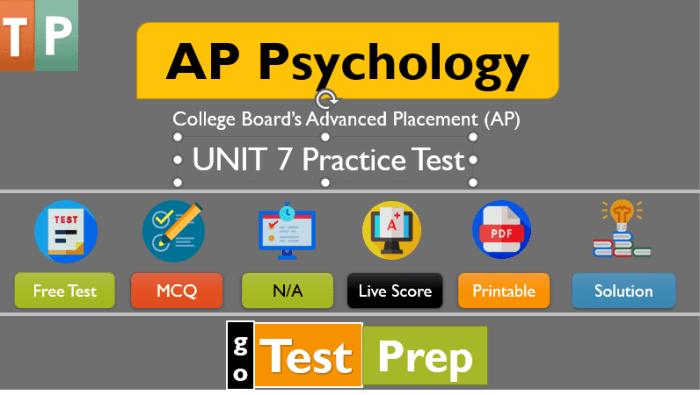Welcome to fiveable AP psychology unit 7, adventurers! In this chapter of our psychological voyage, we’ll embark on an intriguing expedition into the depths of personality, unraveling the mysteries that shape who we are. From the profound insights of psychoanalytic theory to the practical applications in therapy and beyond, get ready to expand your understanding of the complexities that define us.
As we delve into the theories that attempt to explain the intricate tapestry of personality, we’ll encounter the iconic works of Freud, Jung, and Rogers. We’ll explore the methods psychologists employ to assess personality, from the depths of projective tests to the nuances of observation.
And as we navigate the realm of personality disorders, we’ll gain insights into the challenges and complexities that can arise within the human psyche.
Unit Overview
Unit 7: Social Psychology in AP Psychology delves into the fascinating realm of how individuals think, feel, and behave within social contexts. This unit is crucial as it explores the profound impact of social influences on our psychology, shaping our attitudes, beliefs, and actions.
The unit encompasses a wide range of key topics, including:
- Social Cognition: Understanding how we perceive, interpret, and remember social information.
- Social Influence: Examining the various ways in which others can influence our thoughts and behaviors.
- Social Development: Exploring how social experiences shape our development throughout the lifespan.
- Social Relationships: Delving into the complexities of human relationships, including attachment, love, and prejudice.
- Applied Social Psychology: Investigating how social psychology principles are used to address real-world issues.
Theories of Personality
Personality refers to the unique and enduring patterns of thoughts, feelings, and behaviors that characterize an individual. Over the years, psychologists have proposed various theories to explain the development and structure of personality. These theories can be broadly classified into three main categories: psychoanalytic, humanistic, and trait theories.
Psychoanalytic Theories
Psychoanalytic theories, pioneered by Sigmund Freud, emphasize the role of unconscious processes in shaping personality. According to Freud, personality is largely determined by childhood experiences, particularly the conflicts and anxieties that arise during the psychosexual stages of development. Psychoanalytic theories focus on the interplay between the id, ego, and superego, and how these internal forces interact to influence behavior.
- Id:The id is the primitive, instinctual part of the personality that seeks immediate gratification.
- Ego:The ego is the mediator between the id and the external world, responsible for balancing the demands of the id with the constraints of reality.
- Superego:The superego represents the moral conscience, incorporating societal values and ethical principles.
Humanistic Theories
Humanistic theories, such as those proposed by Carl Rogers and Abraham Maslow, focus on the individual’s potential for growth and self-actualization. These theories emphasize the importance of free will, personal responsibility, and the subjective experience of the individual. Humanistic theories view personality as a dynamic process that is constantly evolving and shaped by the individual’s interactions with the environment.
- Self-concept:The self-concept refers to the individual’s beliefs and perceptions about themselves, including their strengths, weaknesses, and values.
- Self-actualization:Self-actualization is the process of realizing one’s full potential and becoming the best version of oneself.
Trait Theories
Trait theories, such as those developed by Raymond Cattell and Hans Eysenck, focus on identifying and measuring the stable characteristics or traits that make up an individual’s personality. These theories assume that personality is relatively fixed and can be described using a set of personality traits.
Trait theories have been widely used in research and have contributed to the development of personality inventories and assessments.
- Big Five Personality Traits:The Big Five personality traits, also known as the Five-Factor Model, are a widely accepted set of traits that describe the major dimensions of personality: openness, conscientiousness, extraversion, agreeableness, and neuroticism.
- Personality Inventory:A personality inventory is a questionnaire or test designed to measure an individual’s personality traits based on their self-report.
Methods of Personality Assessment: Fiveable Ap Psychology Unit 7

Personality assessment is the process of measuring and evaluating an individual’s unique personality traits, patterns, and characteristics. Various methods are employed to assess personality, each with its strengths and limitations.
Interviews, Fiveable ap psychology unit 7
Interviews involve face-to-face interactions between an assessor and an individual. They allow for direct observation of the individual’s behavior and communication style. Interviews can be structured, with predetermined questions, or unstructured, with more flexibility for exploration.
Strengths:
To understand the concept of comparative psychology in Fiveable AP Psychology Unit 7, it’s helpful to examine historical examples. For instance, the Athens vs Sparta Venn diagram illustrates the contrasting values and practices of these ancient Greek city-states. By comparing these societies, we can gain insights into the influence of culture on human behavior, a key topic in Fiveable AP Psychology Unit 7.
- Provides direct and detailed information about the individual.
- Allows for follow-up questions and clarification.
Weaknesses:
- Can be influenced by the interviewer’s biases or expectations.
- May not fully capture the individual’s behavior in different situations.
Observations
Observations involve watching and recording an individual’s behavior in various settings, such as work, school, or social situations. They can be conducted in person or through video recordings.
Strengths:
- Provides real-time data on the individual’s behavior.
- Can capture behaviors that may not be apparent in interviews.
Weaknesses:
- May be limited by the observer’s perspective and biases.
- Can be time-consuming and may not provide a comprehensive assessment.
Projective Tests
Projective tests present ambiguous stimuli, such as inkblots or pictures, to the individual, who is asked to interpret them. These tests are based on the assumption that the individual’s interpretations reveal unconscious thoughts and feelings.
Strengths:
- Can access unconscious or hidden aspects of personality.
- May provide insights into the individual’s inner world.
Weaknesses:
- Subjective and open to interpretation.
- Difficult to establish reliability and validity.
Personality Disorders
Personality disorders are mental health conditions that involve long-standing patterns of inflexible and unhealthy personality traits that cause significant distress or impairment in functioning. They typically begin in adolescence or early adulthood and remain relatively stable over time.
Symptoms and Causes
Symptoms of personality disorders can vary depending on the specific disorder, but common features include:
- Persistent patterns of inflexible and unhealthy personality traits
- Difficulty forming and maintaining healthy relationships
- Impaired social and occupational functioning
- Emotional instability and difficulty regulating emotions
- Impulsive behavior and difficulty controlling impulses
The causes of personality disorders are not fully understood, but research suggests a combination of genetic and environmental factors may be involved.
Diagnosis
Personality disorders are diagnosed based on a comprehensive evaluation by a mental health professional. The evaluation typically involves a clinical interview, a review of the individual’s history and symptoms, and an assessment of the individual’s personality traits.
Culture and Personality
Culture exerts a profound influence on the development of personality. It shapes our values, beliefs, attitudes, and behaviors, creating a unique tapestry of traits that define our individuality within a social context.
Influence of Culture on Personality Development
Culture influences personality development through various mechanisms:
- Socialization:Cultural norms and values are transmitted through socialization processes, where individuals learn to conform to societal expectations.
- Language:Language not only conveys information but also reflects cultural beliefs and values, shaping our cognitive processes and self-expression.
- Education:Educational systems reinforce cultural values and teach specific behaviors that are considered desirable within a given society.
- Media:Mass media, including television, movies, and social media, portray cultural ideals and stereotypes that can shape our self-perceptions and behaviors.
Cultural Factors Shaping Personality Traits and Behaviors
Specific cultural factors can shape personality traits and behaviors in various ways:
- Individualism vs. Collectivism:Individualistic cultures emphasize personal autonomy and independence, while collectivist cultures prioritize group harmony and interdependence.
- Power Distance:Cultures with high power distance emphasize hierarchical structures and respect for authority, while cultures with low power distance promote egalitarianism and participation.
- Uncertainty Avoidance:Cultures with high uncertainty avoidance value predictability and stability, while cultures with low uncertainty avoidance are more comfortable with change and ambiguity.
- Masculinity vs. Femininity:Masculine cultures emphasize competition and achievement, while feminine cultures value cooperation and relationships.
Applications of Personality Psychology
Personality psychology finds practical applications in various fields, including therapy, education, and business. Personality assessments can provide valuable insights into an individual’s behavior, motivations, and decision-making processes.
In therapy, personality assessments can help diagnose mental health disorders, understand the underlying causes of psychological problems, and tailor treatment plans to the individual’s specific needs.
Education
In the field of education, personality assessments can be used to identify students’ learning styles, strengths, and weaknesses. This information can help teachers develop personalized teaching strategies that cater to each student’s unique needs.
Business
In the business world, personality assessments are commonly used in hiring, promotion, and team building. By understanding the personality traits of potential employees or team members, organizations can make informed decisions about who to hire or promote and how to structure teams for optimal performance.
Personality assessments can also be used to improve decision-making in other areas, such as risk assessment, marketing, and consumer behavior. By understanding the personality characteristics of individuals, businesses can tailor their products, services, and marketing strategies to specific target audiences.
Questions and Answers
What is the significance of Unit 7 in AP Psychology?
Unit 7 delves into the captivating realm of personality, exploring the theories, methods, and applications that help us understand the unique tapestry of human behavior.
Can you provide a brief overview of the key topics covered in Unit 7?
We’ll traverse the major theories of personality, delve into the methods used to assess it, explore the complexities of personality disorders, examine the influence of culture on personality development, and uncover the practical applications of personality psychology.
What are some examples of personality assessment methods?
Interviews, observations, and projective tests are commonly employed methods for assessing personality, each offering unique insights into the intricacies of the human psyche.
